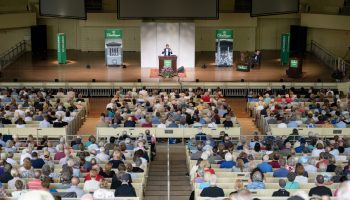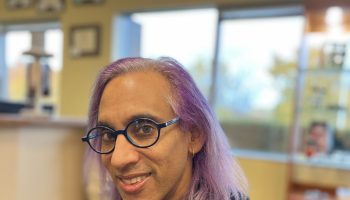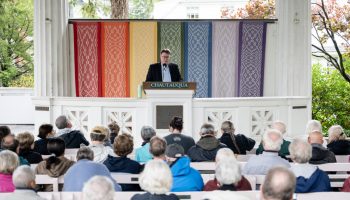For a journalist, winning a Pulitzer is comparable to an actor winning an Oscar. Being honored with more than one is exceptional.
But as a reporter and editor for The Boston Globe, Stephen Kurkjian has shared in three Pulitzers and, in a way, part of two Oscars.
Two Pulitzers were for local investigative specialized reporting; the third came in 2003, when the Globe’s Spotlight Team won for public service, having uncovered extensive and systemic child abuse by clergy in the Boston Archdiocese. The film “Spotlight” — which won the Oscars for Best Picture and Best Original Screenplay — focuses on the initial investigation.
After nearly 40 storied years with the Globe, Kurkjian retired in 2007, but did not stop working. Instead, he began concentrating on two areas of particular interest — one of which is the theft of 13 masterpieces from Boston’s Isabella Stewart Gardner Museum on March 18, 1990.
When he left the Globe, Kurkjian’s 2005 article on this art heist was considered to be the most complete account of the crime, which remains unsolved. He continued to investigate, and last year PublicAffairs published his book, Master Thieves: The Boston Gangsters Who Pulled Off the World’s Greatest Art Heist. That book is now being adapted into a screenplay. At 3 p.m. Saturday at the Hall of Philosophy, Kurkjian will give the fifth talk in the Chautauqua Women’s Club’s 2016 Contemporary Issues Forum series: “The Largest Art Theft in History: Another Path to Recovery.”
“When I came upon the Gardner story, I saw the higher purpose,” Kurkjian said. “These are ‘our’ paintings. They do not belong to the Gardner. Mrs. Gardner, when she opened the door to the museum in 1903, said that this extraordinary collection — the largest private collection being seen by the public anywhere – was for the public. I underline ‘public;’ it’s for the rich and the poor. What’s been missing is the credo to get involved.”
Kurkjian is a native of Boston who attended Boston Latin School before earning a bachelor’s degree in English literature at Boston University and a law degree from Suffolk University Law School. He said that his late father — Anoosh Kurkjian, who at age 3 emigrated from Armenia during the genocide (the Armenian Genocide is the second interest on which Kurkjian is still concentrating) — was an extraordinary painter who earned a scholarship to art school. During the 1930s, he walked over to the museum from school. There, his two cousins, who were concert pianists, played once a week in the Tapestry Room, which connects the rooms from which paintings by Rembrandt and Vermeer were stolen.
“So I take very personally this affront and this loss,” Kurkjian said. “As a reporter, we’re told to be as dispassionate and clinical as a surgeon. With investigative reporting, we’re allowed to show some judgment, but not opinion. My reporting is based on the facts. I call what happened to these pieces of art Boston’s best kept secret.”
He should know. He founded the Spotlight Team — the oldest continuously operating newspaper investigative reporting unit in the U.S. — with three others and was its editor from 1979 to 1986. That year, according to Kurkjian, the Globe decided that its Washington Bureau would benefit from his management skills. He was appointed its chief for six years. While covering the Supreme Court, Justice Department and Bush White House during the first Iraq war, he oversaw the work of 10 reporters.
After returning to Boston in the early 1990s, Kurkjian undertook numerous investigative projects, including the clergy abuse scandal, the devastating Rhode Island nightclub fire and the recovery of a still life painted by Cezanne that had been stolen from a private home in northwestern Massachusetts 28 years earlier. During his time at the Globe, Kurkjian earned more than 25 regional and national awards.
He said what stands out in his mind far more than the Spotlight story is a small article he wrote about blue collar workers who were retrofitting nuclear submarines at the Portsmouth Naval Shipyard along the Piscataqua River separating New Hampshire and Maine. Someone told him that two friends worked there had contracted a rare form of leukemia. Kurkjian and other reporters spent three months investigating death records over a 15-year period and found a slightly higher death rate among those who worked with nuclear materials on submarines.
“The Navy had to apologize.” Kurkjian said. “They did a study, changed how they measured radiation, and changed the radiation suits. This shows the Globe’s willingness to pick up a story about a small group of people that no one else would touch.”
He didn’t lead the Spotlight team during the clergy investigation, but Globe columnist Brian McGrory wrote that Kurkjian “embodies” the team.
“A local power broker once told me that the scariest words anyone in authority might ever hear are, ‘I’ve got Steve Kurkjian on line one,’ ” McGrory wrote in an April 2003 column. “By the time he’s rung you up, take it as gospel that he’s already culled through every possible incriminating record and talked to every damning source. The best you can do is pray.”
Kurkjian said this is the year of his minor celebrity.
“I’m proud of where it stems from — the Academy Award-winning movie, ‘Spotlight.’ I helped found that team in 1970, was an original member, and stayed on it for 16 years, including for the original story in the Globe shown in the ‘Spotlight’ film,” he said.
Although in reality it was he who conducted the interview with the priest who confessed his sins, in the film “Spotlight” the interview was done by his colleague Sacha Pfeiffer. She was portrayed by Rachel McAdams, and Gene Amoroso played Kurkjian.
“They needed to give that scene to a major Hollywood star,” Kurkjian said.
Nevertheless, “that movie has given me a sense of accomplishment for the work I was doing, even before Woodward and Bernstein. And it got me some celebrity.”
That kind of reporting, Kurkjian said, is “reporting with a purpose.”
“It’s beyond a random headline. It’s trying to come up with stories that make a difference,” he said. “That, in the end, was the unwritten charter of the Spotlight Team. Make a difference, whether attacking injustice, corruption or waste in government. If it had not been for the independent journalists reporting those stories, they would not have been known broadly and changes would not have been demanded.”





